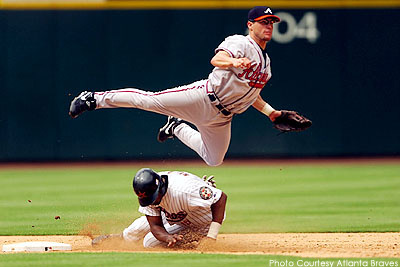The past two days at Fearless Parent, we have been talking about “The Good” and “The Bad” things that go along with having kids play competitive sports, from one mom’s point of view. Today we’re going to hear from some experts… about “The Ugly.” We’re talking about youth sports and bad behavior.
Yikes… something’s not right
The sensational media headlines about athletes are harrowing:
Lance Armstrong Doping Scandal
Cheating Scandal Dulls Pride in Athletics at Harvard
Top Ten Pro Athletes Charged with Murder
Soccer Violence: Referees Under Attack
Doping, cheating, violence, even murder. Not all athletes behave badly, of course, but a lot do.
What’s going on?
Bad news about sports is not limited to professional athletes. Many educators, social workers, psychologists, and other professionals who work with children have been raising concerns about youth sports:
Steubenville Football Coach Knew Athletes Raped Girl, 16,,,
5 Youths Held in Sex Assault on Mentally Impaired Girl, 17
For Children in Sports, a Breaking Point
Kids and Competitive Sports, Too Much Pressure?
Heads Up: Concussion in Youth Sports
Something’s Very Wrong: Sports Parents Drive Me Nuts!
When something bothers me, I research it. In this case, I started reading scads of articles online and a valuable book: Until It Hurts: America’s Obsession with Youth Sports and How It Harms Our Kids because I was feeling like sports (in our case baseball) were hijacking our family life. The author of Until It Hurts, Mark Hyman, is a former high school baseball player and the parent of two boys. As coach to his own kids, he admits to poor judgment calls and outright mistakes. He asks important questions:
At what age should children select and specialize in a sport?
How much training should they do?
What sacrifices should parents and children make?
Countless children who play sports fare just fine, but for some, the harms outweigh the benefits. Families can find themselves in crisis with very little notice.
There’s reason for concern
“Are youngsters from 12 years of age sufficiently mature and emotionally stable to the point where they should be engaging in an experience which has the potentialities for traveling 2,000 miles to play a game of baseball before eight or nine thousand spectators?” [New York Times op-ed, 1952]
Professionals are highlighting the “dark side” of youth sports and alerting us to problems that we must confront and address. They are not saying this happens all the time, but that it does happen with alarming frequency.
Their key concerns include:
1. It’s about adults. Youth sports are becoming professionalized. As with professional sports, they are increasingly designed to meet the emotional, entertainment, and financial needs of adults. Did you know there’s an official Little League World Series banana and detergent? Other LLWS website sponsors include a sugary breakfast cereal, popsicle company, fast food joint, life insurer, and an international hotel brand. ESPN broadcasts thirty-two LLWS games from South Williamsport, PA. The stadium and surrounding areas accommodate more than 40,000 fans. In comparison, the top 10 Major League Baseball teams ranked by 2012 attendance averaged 35,899 fans per game.
2. Adults sometimes teach bad lessons. Parents admit that watching their kids play makes them anxious, irritable, and angry. There’s a lot of yelling. Parents yell at their kids. Coaches yell at the kids. Parents yell at coaches. Parents irritate coaches. Coaches yell at officials. Parents assault officials and each other. Ask around. Chances are that your friends know about an adult who behaved badly at a children’s sporting event in your community.
3. It’s elitist. A lot of attention is being paid to a small group of talented children. Less capable players are benched more often. Many kids quit prematurely or decide not to try at all, concluding that they don’t want the pressure or can’t compete at the level of other players. In 1958, the American Medical Association warned that catering to the most talented players “helps to perpetuate physical unfitness among the rest of children.”
4. It’s too intense. Until recently, children started playing rec sports at 7 or 8. Now it’s 4, and as young as eighteen months in some communities. Children are playing year-round. Some coaches demand 3-4 hour practices a day, 6-7 days a week. Kids become hardened and lose their enjoyment of the sport. For both physiological and psychological reasons, experts insist that kids need extended breaks. Sports psychologist Richard Ginsburg cautions that a child that age can’t differentiate his performance from who he is as a person. The National Education Association advises that high pressure elements give kids an exaggerated importance of sports.
5. It’s dangerous. Children are getting injured at an unprecedented rate; 3.5 million children under 14 are treated for sports injuries annually. Nearly half are overuse injuries and more than half are preventable. Specialized youth sports concussion clinics are “mushrooming,” according to the New York Times. It is no longer rare for children to receive drastic surgical reconstruction, such as Tommy John surgery, originally intended as an extraordinary measure to prolong a professional athlete’s career.
6. Parents are aggressive. Lots of parents are spending tens of thousands of dollars and more to boost their children’s sports careers. Some disclose that the time they spend helping their children is equivalent to a full-time job. The unspoken Holy Grail is an athletic scholarship. As time and expenses rise, so do expectations, making it more difficult for kids to walk away or to switch sports. Adults ignore warning signs and try to keep injured kids in the game. Parents are afraid to raise concerns with coaches. College scholarships for high school athletes are extremely rare.
7. Children don’t have perspective. The intense sports environment can foster distorted relationships, and create opportunities to exploit vulnerabilities: coaches become surrogate parents, parents pursue “the best” coaches, and children can be too eager to please. For most kids, “here and now” is all that they know. They don’t realize that childhood experiences are a mere blip on the radar of their lives. They don’t yet appreciate that time heals emotional wounds, and some of the greatest lessons come from disappointment and failure. Instead, children see how invested parents are in their success and are afraid to quit. As Hyman mentions in his book, some even contemplate suicide rather than confront parental disappointment.
Youth sports need grounded parents
When it comes to sports, I’m no expert, on or off the field. But I’ve been a parent for over 12 years, and I am someone who does research for a living. I love that my sons play baseball. I also want to make sure that they continue to get more benefit than harm out of sports.
Notes to self:
Chill out. I shared in yesterday’s post that baseball was taking on an outsized importance to me. When my boys were babies, they were ill. I realized something surprising: When my kids do well in sports, it is a final affirmation, to me, that they aren’t sick anymore. Yikes, right? While it may be understandable, it’s not helpful. Parents can and should introduce options, but the motivation to play and excel must come from the child. My emotional needs and aspirations do not matter.
Pay attention. If I think something is wrong, something is probably wrong. As my boys get older, I need to watch for problems with sleep, food, grades, drugs, friends, teammates, coaches, injuries, depression, anxiety, and more. I should talk with others, get input, and ask for advice to help keep things in perspective. Even if my son says everything is great, I should still be vigilant.
It has to be fun. I know when my boys are having fun. When they’re not, it’s time to stop. We can change it up. Experts recommend that kids play a variety of sports. Obsession is dangerous, and doing something to please others often doesn’t end well. Burnout sidelines many talented kids.
Moderation is a virtue. I am in the best position to determine if my child is starting too early or training too hard. I now know that overuse injuries are astonishingly common. I shouldn’t sacrifice to the point that it creates resentment in other family members, or skews our priorities.
It’s always a choice. Playing a sport is the child’s choice. Every season, I need to remember to ask my boys: do you want to play? And let them know that I’ll support them either way.
Travel team tryouts start this week. Regardless of the outcome, Nick will be fine. It’s his mom who must remember some important baseball lessons.
Third of three articles (Part 1 and Part 2). This series also appeared in Pathways Magazine
 When she’s not fretting about baseball, Louise Kuo Habakus is the Executive Director of Fearless Parent, and enjoys hearing from parents.
When she’s not fretting about baseball, Louise Kuo Habakus is the Executive Director of Fearless Parent, and enjoys hearing from parents.













Great series, Louise. Thank you.
I read you new posting today. It was fantastic too! There are plenty of pitfalls in American Youth Sports as well as helicopter parenting style and “everybody-gets-trophy” practice in the name of self-esteem promotion. It does take a grounded parent to discern all the good and bad advices and determine what is best for their children.
There are so many factors involved it’s difficult to decide where to start. So let’s go to the root of all evil as the saying goes: Money. In the sixties and early seventies pro football players would work full time jobs in factories, construction, selling insurance, anything they could because it was inconceivable that they could afford to just train as their full time job in the off season due to the average salaries in those days. Now training year round is required to maintain their competitive advantage. One linebacker, James Harrison was recently reported to spend $500,000 annually for trainers, masseuses, nutritionists, supplements, etc. just to keep ahead of the competition and age.
The payoff financially is so huge that so many are willing to sacrifice everything else in their lives for a chance to grasp the brass ring. That’s fine if you have the natural gifts bestowed on you from birth. But I see so many average kids, often with encouragement in terms of motivation, time and money, from their parents going to extreme measures for what? Maybe (emphasize maybe) play division one sports? Then what? The Pros? really? The odds are astronomical. Then what? Take Pro football. The average career for a running back is something like three years. And odds are you will be on the team roster, not a superstar, making the NFL league minimum of $550,000 a year.
Granted, not too shaby, but how many exit Pro football, having made, say, $1,000, 000 after taxes, for their career? What’s next? Often their focus has been on sports and not the many years to come. Are they set for life? Do they have debilitating injuries for life? Are they set educationally to pursue meaningful careers? The attraction of instant fame usually obscures those bigger life questions. So it is important for parents to take a serious look at (in their eyes) their budding prodigy and question the end goal and motivations for sacrificing so much else life has to offer, in the remote chance that their child may have his “15 minutes” of sports fame.
I look at my experience in high school. I played multiple sports, enjoying them all, had academic and artistic interests and outlets as well. And had a full, well rounded education as a result. Place me in today’s environment with my same average abilities, restrict much of my other activities and opportunities for growth as often is required in order to concentrate on one sport only in the remote chance that it may lead me the next level, whatever that may be. And when, as odds would dictate, I don’t rise to the pinnacle, what then? What other skills have I neglected to develop that may serve me in the future, in order to become a “pretty good” football player or baseball player or skier or whatever? We place too much emphasis on fame. The fact that some Reality shows (mostly mindless drivel IMHO) are amongst the highest rated programs reflects that.
great series. It is dangerous to play the same sport year round as a child. There was just an article in one of the journals we get talking about there is such a rise in adolescent injuries bc of specializing in one sport. My husband is part of a small group of high level physical therapists, one of them has been r
repeatedly told by scouts that they won’t look at a pitcher for the periods if he pitched in highschool